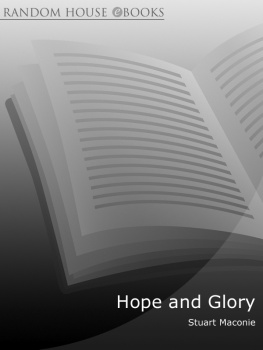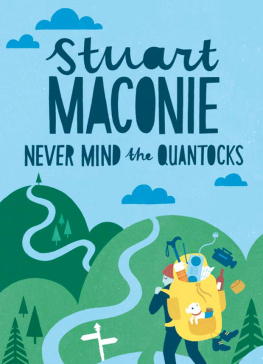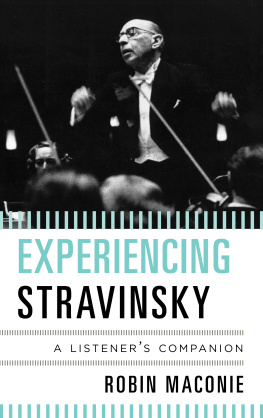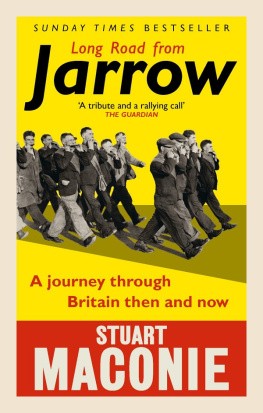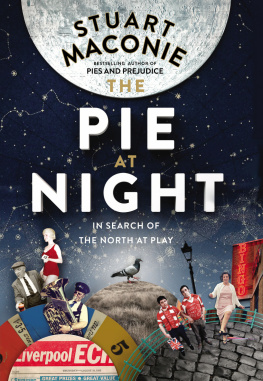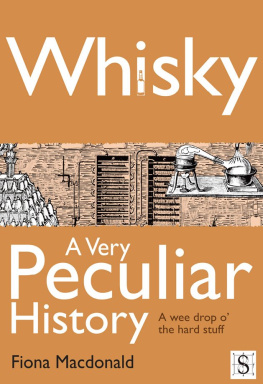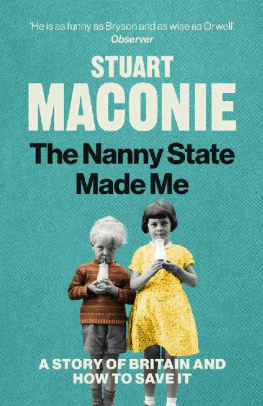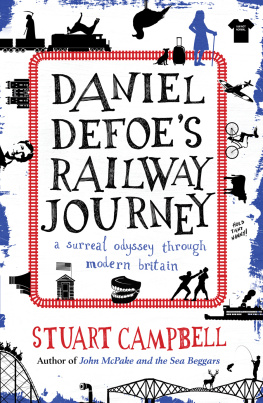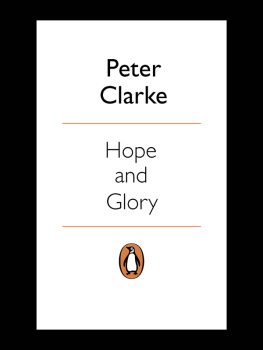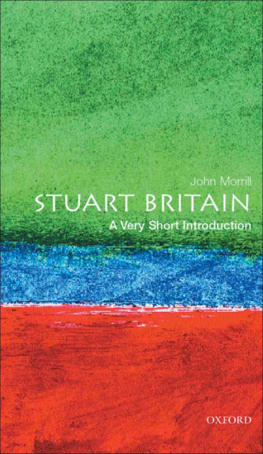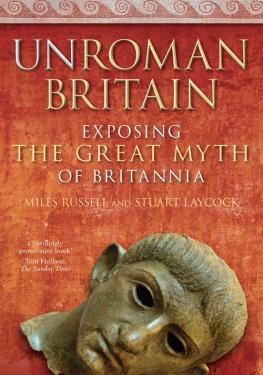
CONTENTS
These were the days that made us, and these are the day trips to find them. Should we do a flask? And are you sure youll be warm enough in that coat?
In Hope and Glory Stuart Maconie goes in search of the places, people and events that have shaped modern Britain. Starting with the death of Queen Victoria, to the Battle of the Somme and the General Strike, and on to the docking of the Empire Windrush and Bobby Moore raising the Jules Rimet trophy, he chooses a defining moment in our nations story from each decade of the last century and explores its legacy today.
Some were glorious days, some were tragic, or even shameful, but each has played its part in making us who we are as a nation. From pop stars to politicians, Suffragettes to punks, this is a journey around Britain in search of who we are.

S TUART M ACONIE is a writer, broadcaster and journalist familiar to millions from his work in print, on radio and on TV. He has presented shows on practically every BBC radio network and currently hosts the afternoon show on 6Music with Mark Radcliffe. His weekly 6Music show The Freak Zone is a global cult. His work as a journalist has appeared everywhere from NME and Q Magazine to the Daily Telegraph and the Oldie. He is a regular columnist for publications as diverse as the Daily Mirror, Radio Times and Country Walking Magazine. His previous bestsellers have included Cider with Roadies, Pies and Prejudice, and Adventures on the High Teas and his books have been translated into Italian, Japanese and Russian. He is based in the cities of Birmingham and Manchester and the wilds of the Lake District where he can often be spotted on top of a mountain with a thermos and an individual pork pie.
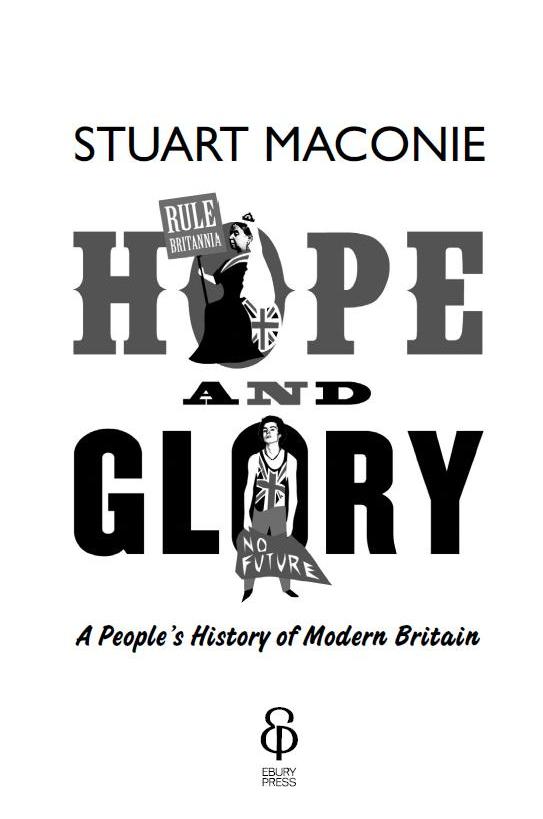
Extract from The Hard Way Up: The Autobiography of Hannah Mitchell, Suffragette and Rebel the Estate of Hannah Mitchell and reproduced by permission of Faber and Faber Ltd
Quotations from First World War servicemen taken from Forgotten Voices of the Somme by Joshua Levin and the Imperial War Museum. Published by Ebury Press
MCMXIV and Days taken from Collected Poems by Philip Larkin the Estate of Philip Larkin and reproduced by permission of Faber and Faber Ltd
The Send Off by Wilfred Owen quoted with kind permission of the Wilfred Owen Literary Estate
An English Journey by J. B. Priestly is quoted with kind permission of United Agents on behalf of the J. B. Priestly Literary Estate
Ed Douglass article Reach for the Sky Guardian News & Media Ltd 2004 is quoted with kind permission
David Hepworths blog quoted by kind permission
Morrissey interview Time Out quoted with kind permission
Every effort has been made to trace and contact the copyright holders of quoted material. If notified, the publisher will rectify any errors or omissions in subsequent additions.
INTRODUCTION
Chairman Mao was one of those blokes who was always saying things. So many things in fact that he filled a whole book with them. Its a little one, though; positively dinky, actually, about the size of an iPod, bright red, and hugely popular in the China of its day, chiefly through the astute marketing strategy of it being compulsory to carry a copy on pain of getting beaten up by the Red Guards.
To be honest, Maos Little Red Book needed some of this kind of proactive promotional campaign. Heres what he probably thought was a really sexy bit: Marxist dialectical materialism, which connotes the constant struggle between opposites in an empirical setting, is the best method toward constant improvement. Objective analysis of problems based on empirical results is at a premium. Despite this, the print run ran to roughly six billion copies, of which none was in a pink cover featuring a pair of gold strappy sandals and a bottle of Chardonnay.
Sometimes, though, when feeling particularly waggish after a hard day reviewing rice yields, the Chairman would make a little joke. When asked what he thought of the French Revolution, he famously replied, Its too early to say yet. This was what passed for a thigh-slapper of a wisecrack in revolutionary China. But it was also an astute piece of social analysis. What the old rogue meant was that, despite what pageantry junkies like David Starkey and the makers of those commemorative plates you see advertised in the back of the Radio Times say, history and culture doesnt really proceed via coronations and beheadings and uprisings but is shaped by the less glamorous but more profound gradual shifting of underlying historical forces; slow and tidal, as forceful as a glacier but about as nippy and sexy as an MT Hellespont Alhambra T1 Class Double Hulled Ultra Large Crude Carrier Class Supertanker (I appreciate that this is a somewhat niche analogy but those who get it will love it. Sadly, guys, its the last oil tanker reference in the book. Off to the till anyway, eh?).
The Chairmans thinking chimes with the sort of stuff I used to trot out as a young sociology teacher in Skelmersdale in the mid-1980s. I was in my early twenties, the same age as most of my students, and it was in many ways a more hedonistic and rock and roll job than my next one, a writer for the NME. But thats another story. During our more tranquil moments, I would tell my enthusiastic charges that despite what the shallow news media of the day might try to imply, society was not about strikes and explosions and random newsworthy events but those deep subterranean tectonic plates of class, economy, power and science grinding away over the centuries. Understandably, at this point, they would say, Can we do Deviance again, Stu?
And so with apologies to Sophie and Tracy and Taudy and Sam and Soft John and, for that matter, Chairman Mao, heres a book all about red-letter days made up of shocking events, terrorism, pageantry, death, scientific breakthroughs, adventure, violence, rock and roll, horror, romance; the indisputably newsworthy, the defiantly photogenic, the unashamedly thrilling.
Over the last year or so and over the next few hundred pages, I have travelled in search of the days that have shaped the Britain we live in today. Ive chosen a day from each decade of the twentieth century, partly for neatness (a day a decade and a chapter for each making a nice round ten chapters) and partly because I really believe that the century not long gone is still the most profoundly influential one in terms of how we live and love and work today. The last decade or so has seen enormous cataclysmic even news stories but theyve tended to happen elsewhere New York, Baghdad, etc. and so for me these ten days are the ones that are still resonating through our cultural lives, our fun, our jobs, our cities, our families, our streets, our countryside. I visit the places where these events happened and where their echoes can be heard down the years: from the corporate pizzazz of the new Wembley to the funeral parades of Wootton Bassett, from the mountains of Snowdonia to the Portuguese cafes of Norfolk, from the sleepy seaside of the Isle of Wight to Manchesters city centre in Freshers Week, from Holmfirth and Accrington and Orgreave to Sandringham, Millbank and Tolpuddle.
Next page
